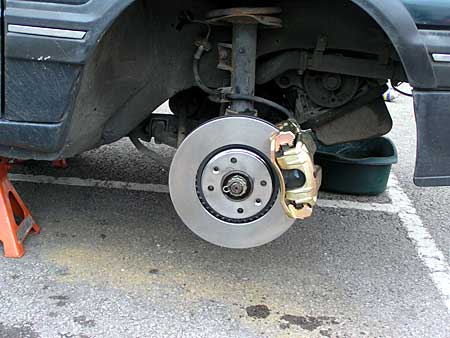
Introduction:
This is a guide to buying and fitting a big brake conversion to your 1.9 GTI. Note the yoke will not fit the hub of lesser models, including the 1.6 GTI. Not only that, the 283mm discs mean the caliper will need 15" alloys minimum to fit. You need to check that if you are using 15" alloys i.e. 1.9 speedlines that there are no balancing weights inside the wheel as the caliper will almost certainly foul on them. The donor vehicle is a 307 HDi/2.0 Petrol, although they use the same yokes and calipers as the 206 GTI 180. I believe the only difference is the GTI 180 uses uprated pads from the 307 models.
Tech specs:
The new setup comprises of bigger discs, both in diameter and ventilated width, bigger calipers, quite literally which is to accommodate the bigger slave piston and bigger pads. The surface area of the 206/307 pad is bigger than those in the standard 205 setup, and in my opinion, you will not need uprated pads if using the bigger brakes for fast road. I cannot say how they last on a trackday, as i have not been able to test them thoroughly yet. See the end for information on availability of uprated discs and pads. Lastly, ive fitted the brakes using standard rubber hoses and for me they are of good length to work with the larger calipers. I'd advise anyone to check before they drive off that the hoses are not stretched or deformed at any point from lock to lock.
One area of slight concern some people have when looking at these conversions is the pedal travel with the bigger slave cylinders. The pistons in the 205 GTI brakes (1.9) are 48mm diameter. I believe the caliper pistons from both donor cars are 54mm, so you can see that the new brakes will require more fluid movement to get the same extension. As a result of this the pedal wont be as instantly reactive as the standard setup, and some people will say that a bigger master cylinder is required to make the brakes more reactive. Bigger master cylinder is not required as much as when 306 GTI-6 brakes are used, as those have 57mm pistons. I've been using the 307 brakes for a while now, 100% road use, and find the extra travel allows more accurate actuation which results in a more comfortable ride under braking. At the end of the day its down to how you like the car to react, but many people who have already fitted larger brakes feel comfortable with the standard master cylinder.
Side by side, the bigger conversion pieces:
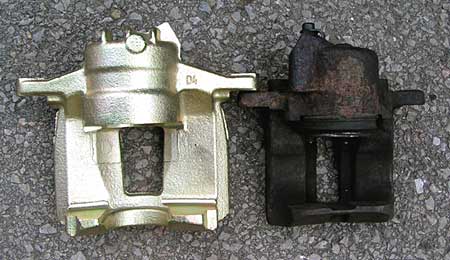
shiny new big calipers
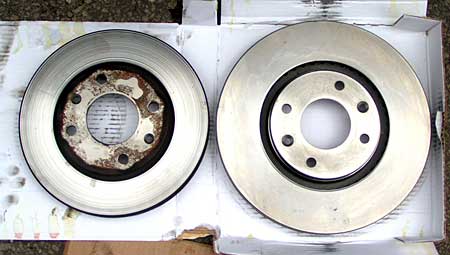
247mm vs 283mm discs
This procedure should be exactly the same for fitting brakes from a 306 GTI-6 (which have larger piston and use thinner discs). I will list the alternative parts at the end of this guide.
Before we start, I will say that this job is not a difficult one and can be done yourself although it's easier to have atleast one person helping out (or getting the tea's in). I must stress however, that the brakes are a crucial system of the car and if you have the slightest doubt then either get assistance from someone who is familiar with basic car mechanics, or ask for advice on the forum. It is not worth risking your safety doing this job.
Buying the bits:
Prices from Peugeot dealer, correct in the month of May 05.
307 2.0 XU10 brake calipers and yokes:
4400N2 - Caliper - £51.14 +VAT
4400N3 - Caliper - £51.14 +VAT
440465 (x2) - Yoke (single) - £18.84 +VAT
That lot comes to a grand total of £164.48 (inc VAT).
You will also need to source disks and pads. I didn't compare many places but found brakepart.co.uk to be extremely competitive:
BPS2701 - Pad Set - £19.76 +VAT
BDS5912 (x2) - Single Disc - £24.75 +VAT
Delivery - £5.00
So that's another total of £87.26 (inc VAT).
It's also worth having some spare brake fluid for topping up the system when you're done. This will cost upto £5 depending where you buy and how much you get. You shouldn't need much of it. In all, the whole conversion can be bought for £260, if not less.
All the parts, ready to go:
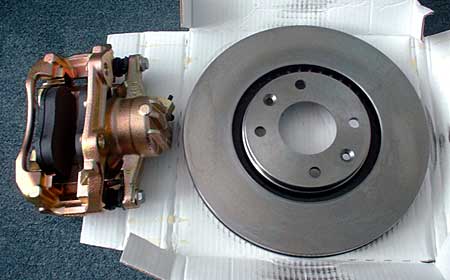
307 brakes out of the box
The job:
Ensuring you have the right parts, a good tool kit (ratchets, sockets, spanners and a breakers bar recommended) and plenty or refreshments, it's time to start. When I did this myself, I did this one step at a time switching from side to side. It won't make a hell of a difference, but this seemed logical to me.
Slacken the wheel bolts (19mm), jack the car up, drop it onto axle stands and remove wheel bolts and wheels. Pop the bonnet and undo the brake fluid reservoir cap.
Slacken the rubber hose at the caliper end very slightly. This is easier to do now whilst the caliper is solidly mounted. If I remember right its a 14mm union.
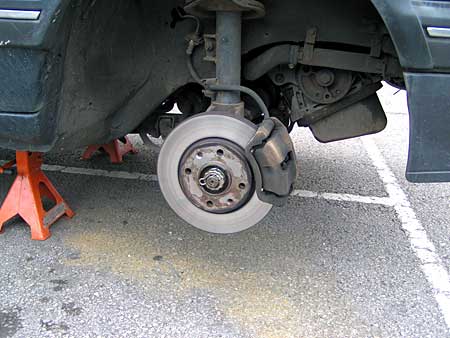
the standard setup, not for long
Undo the caliper bolts, they should be 13mm. The caliper will now be free from the yoke. Rest the caliper on top of the disc against the suspension strut, or tie it up to the spring. Do not let the caliper dangle free or you could damage the rubber hose. You can now remove the old brake pads too.
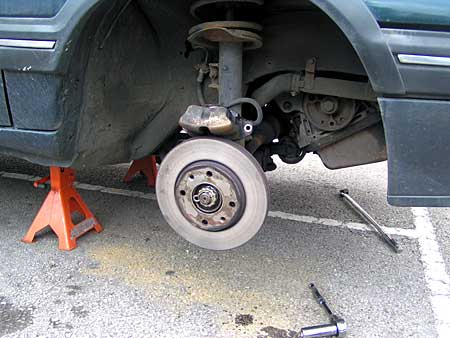
caliper resting on the disc
Undo the caliper yoke bolt, this should be 17mm. It is likely this will be tight so I advise using a breaker bar for extra leverage. Just watch you don't rap your knuckles when the bolts do break loose.
Remove any retaining screws in the disc, if fitted. Then swap the discs over for the new, bigger items. Avoid touching the friction surface of the disc, especially if your hands are dirty or greasy. It's a good idea to clean the discs once finished anyway.
Fit the new larger caliper yokes. I used the original yoke bolts as they were in good condition and didn't need replacing in my opinion. Take care not to scratch the discs when fitting. For peace of mind, you could use a bit of loo roll for protective padding.
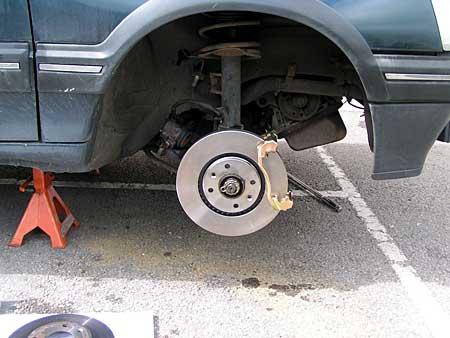
new discs and yokes fitted
Fit the new brake pads. These slide into the yoke from either side of the discs. Nice and easy.
Next, the potentially messy bit. It may help to get an extra pair of hands here. Get a bucket or a bowl ready to catch any spilt brake fluid. I didn't get more than a few drops from each caliper but that's not to say others won't be different. Make sure the new caliper is to hand, and then unscrew the old caliper off the rubber hose and screw on the new caliper.
Fit the caliper over the yoke and bolt on. Peugeot handily supply new bolts with both the calipers and the yokes so you will have a few spare too.
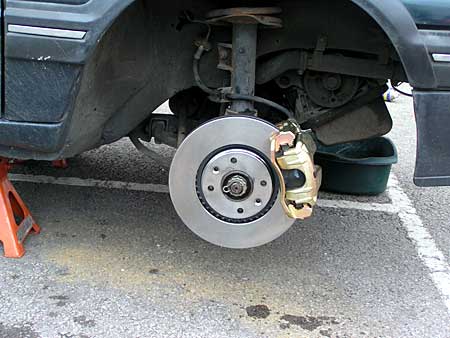
307 setup completely fitted
Bleeding the air:
Don't forget to nip up the rubber hose union; last thing we want is any leaks. Now is a good time to check the reservoir and top it up if its low. You should avoid allowing air into the master cylinder as this can cause all sorts of problems; it's really not worth finding out the hard way!
Now comes the skilled bit. Before you can even contemplate driving again, you need to bleed the brakes. To do this you can use the traditional method, which requires an extra man, an 8mm spanner, some thin hose and the return of your bucket. The procedure to do this can be found in any half decent workshop manual. Alternatively you can use a one man kit such as the ezi-bleed system, which you should be able to buy in motorfactors. Follow the manufacturers instructions for each individual kit. Personally, I borrowed a mate who knew what he was doing and got it right first time. Cheers James ;-)
Now you should be finished. Check all the bolts and hoses are tight, the reservoir is topped up, your discs are grease free and your wheels are securely attached. For the very first miles you should drive cautiously and allow plenty of distance for braking. Check manufacturer specifications for recommended bedding in requirements, it's normally about 150 miles.
Brake fluid is nasty stuff and should not be taken lightly. Please dispose of brake fluid at a local waste disposal unit provided by your council.
Info about 306 GTI-6 brakes:
As I said at the beginning, this procedure should be exactly the same for fitting the bigger brakes from a 306 GTI-6. I have sourced these part numbers from a copy of the Peugeot parts manual I have, so I cannot guarantee that they are correct, but I would expect they are. The prices were posted up on the forum the same time as I purchased the 307 setup so they should be fairly accurate in comparison. They are much more expensive and I see no reason why you would buy them from new over the 307 setup, however these do come up on ebay from time to time so its handy to check your bidding on good products.
306 2.0 XU10J4RS brake calipers and yokes:
4401A4 - Caliper (Left) - £51.67 +VAT
4401A5 - Caliper (Right) - £51.67 +VAT
440439 (x2) - Yoke (L+R) - £122.67 +VAT
Pads and discs upgrade:
If you wish to purchase uprated discs and pads for either setup, look through the common internet shops, for example; Demon Tweeks, Rally Design etc. There is a greater range of suppliers for the 306 GTI-6 setup although a few manufacturers supply the 307 setup also. A quick search on Demon Tweeks shows EBC grooved discs (each) cost £56.70 for the GTI-6 (283x22mm) and £63.00 for the 307 (283x26mm), and EBC Green Stuff pads cost £42.13 for the GTI-6 and £30.23 for the 307. Other manufacturers to be considered are Pagid, Black Diamond, Red Dot, Ferodo and Mintex. Many forum members hold Mintex 1144s in high regard, although personally i havent tried them in any form. For advice and opinions on uprated brake components then search the forum and ask around.
Once again, if you have any problems with either brake conversions, or your brakes in general, do not be afraid to post on the forum. In almost every case, someone is able to help or point in the right direction.

